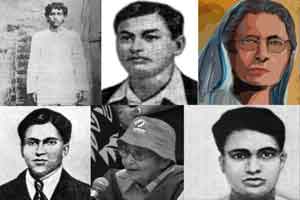Bahadur Shah Zafar, born on October 24, 1775, was the last ruler of the Mughal […]
![]()

The Indian Revolutionary movement was a crucial period in India’s struggle for independence from British colonial rule. The movement was characterized by various leaders and activists who fought for the rights and freedom of their countrymen through various means, including non-violent resistance and armed struggle.
One of the most notable figures of the Indian Revolutionary movement was Subhas Chandra Bose, also known as Netaji. Bose was a charismatic leader who believed that India’s freedom could only be achieved through armed struggle. He founded the Indian National Army (INA), which aimed to liberate India from British rule with the help of the Axis powers during World War II. Although the INA’s efforts were ultimately unsuccessful, Bose’s unwavering determination and commitment to the cause inspired generations of Indians to fight for their freedom.
Another prominent leader of the Indian Revolutionary movement was Bhagat Singh, who was instrumental in the formation of the Hindustan Socialist Republican Association (HSRA). The HSRA was a group of revolutionaries who believed in the use of violence to achieve India’s independence. Singh was eventually arrested and executed by the British authorities, but his legacy lives on as a symbol of India’s struggle for freedom.
The Indian Revolutionary movement also had many unsung heroes, including the women who played a crucial role in the fight for independence. One such woman was Rani Lakshmibai, the queen of Jhansi, who led her troops in battle against the British during the Indian Rebellion of 1857. She is remembered for her bravery and unwavering commitment to her people’s cause.
In conclusion, the Indian Revolutionary movement was a crucial period in India’s history that saw the rise of many leaders and activists who fought for their country’s freedom. Their unwavering determination and commitment to the cause inspired generations of Indians to fight for their rights and ultimately led to India’s independence in 1947. Today, their legacy lives on as a reminder of the sacrifices made by those who came before us and the ongoing struggle for freedom and equality.
Bahadur Shah Zafar, born on October 24, 1775, was the last ruler of the Mughal […]
![]()
Shivaram Rajguru: Shivram Rajguru, one of the leading figures of India’s freedom movement, was a […]
![]()
Rani Lakshmibai, the legendary queen of Jhansi, stands as a symbol of valor, resilience, and […]
![]()
Industrial Revolution: The Industrial Revolution, a period of profound transformation that began in the 18th […]
![]()
The American Revolution: The American Revolution, a seminal event in the history of the United […]
![]()
Nelson Mandela: The Iconic Leader Who Transformed South Africa Nelson Mandela, also known as Madiba, […]
![]()
Fidel Castro: The Revolutionary Leader Who Shaped Cuba Fidel Castro is a name that evokes […]
![]()
Che Guevara: The Revolutionary Icon Who Continues to Inspire Generations Ernesto “Che” Guevara was a […]
![]()
Mao Zedong: The Rise and Fall of a Revolutionary Icon Mao Zedong, born on December […]
![]()
Vladimir Lenin: A Revolutionary Leader Who Transformed Russia and Shaped the World Vladimir Lenin was […]
![]()